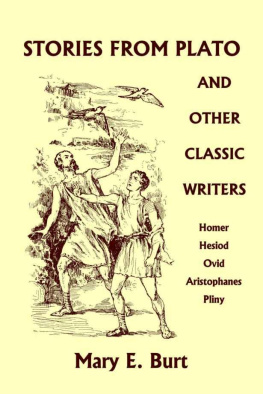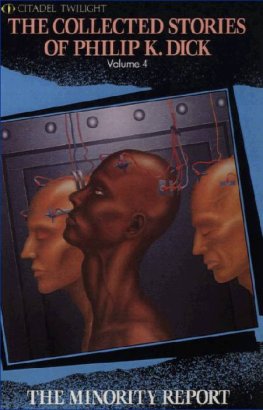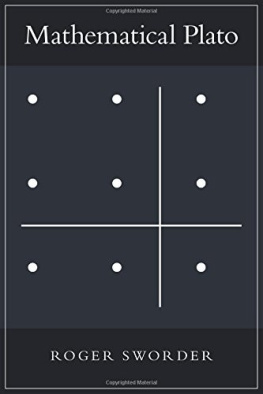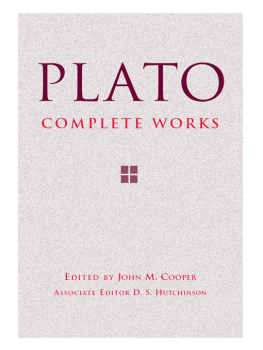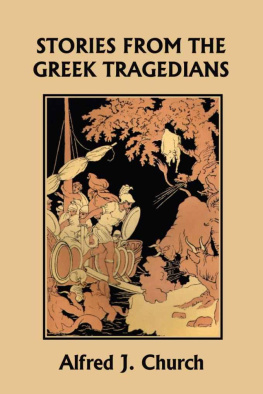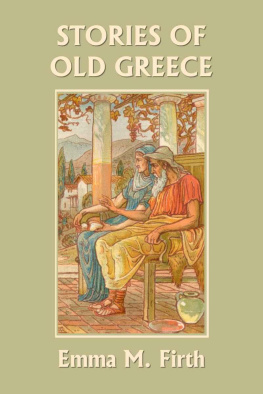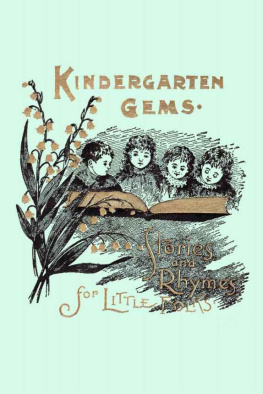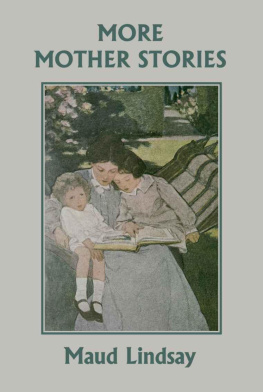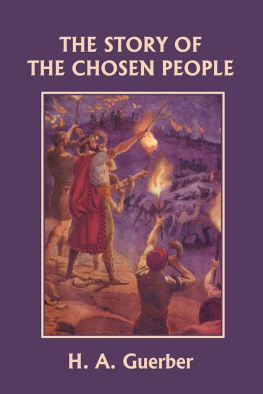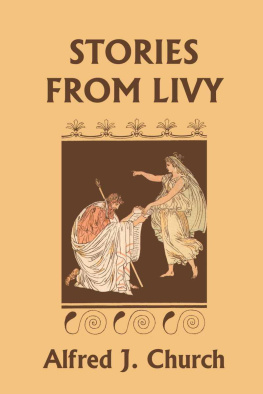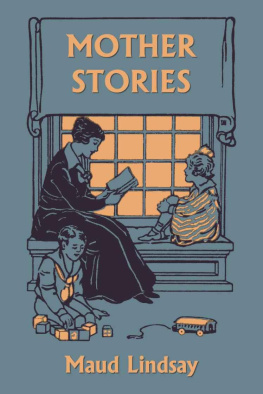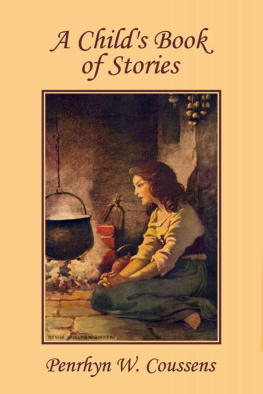Stories from Plato and Other Classic Writers
by
Mary E. Burt
Yesterday's Classics
Chapel Hill, North Carolina
Cover and Arrangement 2010 Yesterday's Classics, LLC
All rights reserved. No part of this book may be reproduced or retransmitted in any form or by any means without the written permission of the publisher.
This edition, first published in 2010 by Yesterday's Classics, an imprint of Yesterday's Classics, LLC, is an unabridged republication of the work originally published by Ginn & Company in 1894. This title is available in a print edition (ISBN 978-1-59915-309-4).
Yesterday's Classics, LLC
PO Box 3418
Chapel Hill, NC 27515
Yesterday's Classics
Yesterday's Classics republishes classic books for children from the golden age of children's literature, the era from 1880 to 1920. Many of our titles are offered in high-quality paperback editions, with text cast in modern easy-to-read type for today's readers. The illustrations from the original volumes are included except in those few cases where the quality of the original images is too low to make their reproduction feasible. Unless specified otherwise, color illustrations in the original volumes are rendered in black and white in our print editions.
Preface
T HERE is one mind common to all individual men. Every man is an inlet to the same, and to all of the same. He that is once admitted to the right of reason is made a freeman of the whole estate. What Plato has thought, he may think; what a saint has felt, he may feel; what at any time has befallen any man, he can understand."
When a thought of Plato becomes a thought to me,when a truth that fired the soul of Pindar fires mine, time is no more.
E MERSON
While it is good to walk among the living, it is good also to live with the wise, great, good dead. It keeps out of life the dreadful feeling of extemporaneousness with its conceit and its despair. It makes us always know that God made other men before He made us. It furnishes a constant background for our living. It provides us with perpetual humility and inspiration.
Shakespeare has no biography; and, much as we would like to know what happened to him in his life, I think we all feel doubtful whether we should get much of increased and deepened richness in our thought of him if what he did and said had been recorded. The poet's life is in his poems. The more profoundly and spiritually he is a poet, the more thoroughly this is true, the more impossible a biography of him becomes.
Let men like these talk to you and tell you of themselves. Being dead, they yet can speak. How good it is sometimes to leave the crowded world, which is so hot about its trifles, and go into the company of these great souls which are so calm about the most momentous things!
P HILLIPS B ROOKS
Introduction
Two years ago I was asked by the Kindergarten Association of Chicago to read several papers at their Institutes on the adaptation of stories from classic sources to kindergartens. Leaders among kindergarteners had long before agreed that literature manufactured merely for commercial speculation had not vitality enough to meet the needs of the child. They had themselves resorted to Homer's Iliad and Odyssey, as a relief from the wearisomeness of the reading-matter of reading-books. I took the ground that teachers would derive more pleasure in their work if they were allowed a sweeping use of literature in their schools, each teacher detaching from classic or standard writings such hints and suggestions as she could use to the best advantage. I read about fifty stories which I had gleaned from Plato, Homer, Hesiod, Aristophanes, Pliny, Ovid, and other classic sources as illustrations of the material which teachers might select from the original writings.
These stories I had found useful in previous schoolwork, because they contained fine moral points, or else because they were poetic statements of natural phenomena which might enhance the study of natural science.
I was urged by many of my audience to publish the stories for kindergarten use. Since then it has come in my way to use the stories with children of ages varying from six to twelve years, and I am satisfied that the collection is suitable as a primary reader; and I linger with grateful thought over the remembrance of the teachers and children, who, amid the allurements of life, could "leave the crowded world which is so hot about its trifles, and go into the company of those great souls which are so calm about the most momentous things."
Many thanks are due to the intelligent assistance of the Librarian and Attendants of the Chicago Public Library, and to the Editors of the Inter-Ocean for the "I Will" etchingsymbol of the life which renews itself as well from ancient as from modern fire.
M. E. B.
NEW YORK, Dec., 1893.
Contents
CHAPTER I
A Dream That Came True
T HERE was once a boy who loved to go to school, and it was no great wonder, for he lived in a golden age, and in a golden clime.
The streets of the city in which he dwelt were full of gleaming statues, all open to the air, and teachers and pupils walked and talked together a great deal out of doors, where they could see the violet tinted mountains and the shining sea.
This boy had one teacher, a remarkably wise one, who loved to gather a little circle about him on almost any corner. He did not tell his pupils anything. He merely asked them questions to set them thinking. One of his puplis said that he had to put his fingers in his ears and run away or he should grow old listening, so delightful were the lessons.
This wise teacher had a dream which was so good that perhaps we ought to know it. He dreamed that he had a beautiful white swan in his bosom.
The bird was so young that it had no feathers, but he watched it and fed it with great care. As soon as the feathers came upon it, the bird stretched its wings and flew with the intrepid courage into the highest regions of air singing with inexpressible sweetness.
The teacher never doubted that the swan was his good pupil who loved to go to school, and that he should enjoy boundless fame.
CHAPTER II
The Goodness That Is Within
I WONDER if the children who are going to read this story or listen to it, like to get up early in the morning. I wonder if they want to be good and are so anxious about it that they cannot sleep.
I wonder if they think they can learn to be good, or if they believe goodness is inside to start with and that it must grow and grow itself. Perhaps some little boy may think that he is not old enough to know these things, but we can tell better when we hear what the children say after the story is done.
It happened a long time ago that a young man wanted to be good. Yes, it was a long, long time ago, but who knows but what it may happen again some time?
He wanted to be good so badly that he could not sleep and so he got up in the night and went to the house of a friend to tell him about it.

